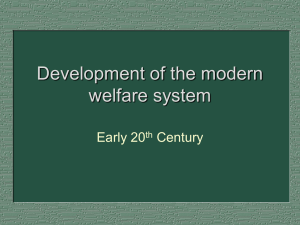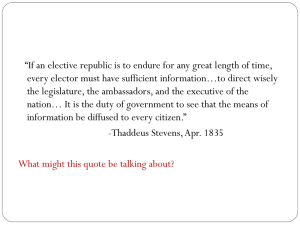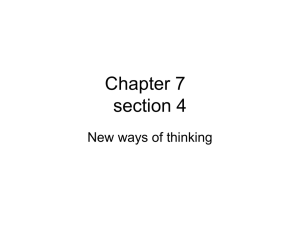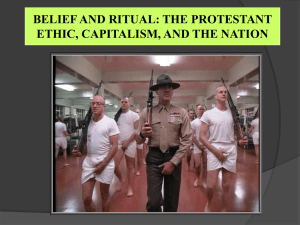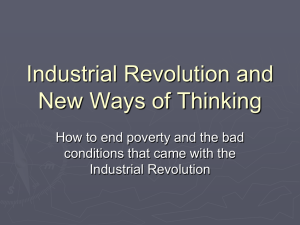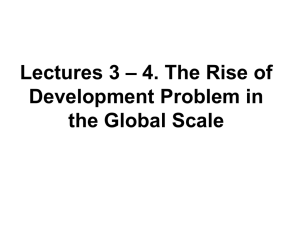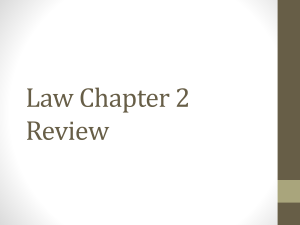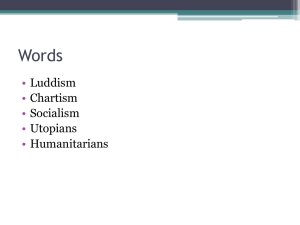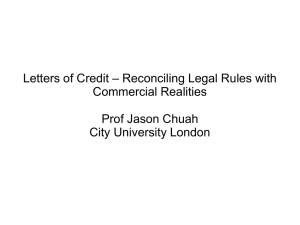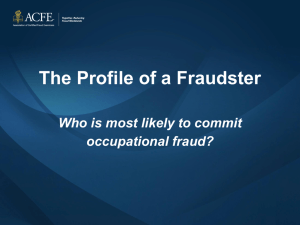Marketized - Northeastern University
advertisement
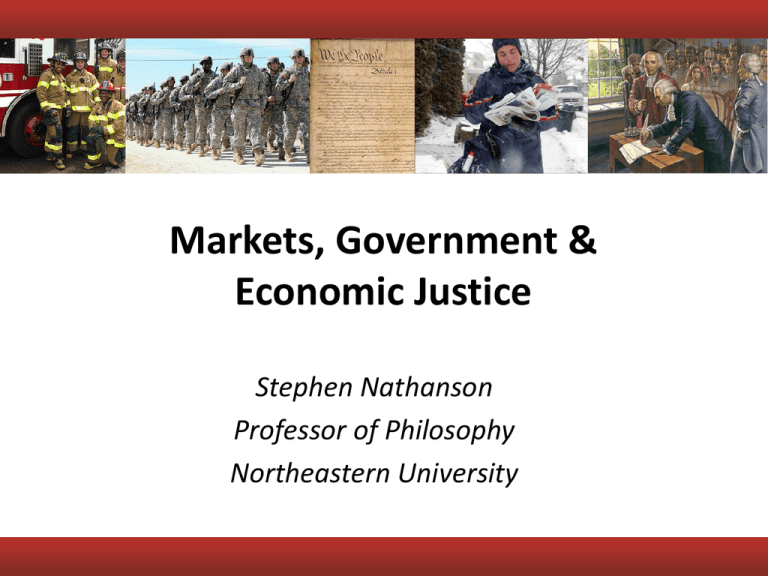
Markets, Government & Economic Justice Stephen Nathanson Professor of Philosophy Northeastern University President Obama’s Response to Critics of his Economic Policies Press Conference, February 2009 “Now, maybe philosophically you just don't think that the federal government should be involved... I happen to disagree with that.” “Some of the criticisms [of my proposals] really are with the basic idea that government should intervene at all in this moment of crisis. You have some people, very sincere, who philosophically just think the government has no business interfering in the marketplace. And in fact there are several who have suggested that FDR was wrong to intervene back in the New Deal. They're fighting battles that I thought were resolved a pretty long time ago….” President Obama’s Appeal to the Opinions of Economists Press Conference, February 2002 “Most economists, almost unanimously, recognize that even if philosophically you're… wary of government intervening in the economy, when you have the kind of problem we have right now … government is an important element of introducing some additional demand into the economy.” Capitalism State Socialism *Private ownership of property -----------------------*Market system of production & distribution *Public ownership of property ----------------------*Planned economy with public control of production & distribution ----------------------*To each according to need (or an equal share) -----------------------*To each according to ability to pay + gifts Recent books on the spectre of socialism •To Save America: Stopping Obama's Secular-Socialist Machine Newt Gingrich •Revolt!: How to Defeat Obama and Repeal His Socialist Programs Dick Morris and Eileen Mcgann •Radical-in-Chief: Barack Obama and the Untold Story of American Socialism Stanley Kurtz Is Socialism Bad? Three Criticisms Socialism has not worked well as a productive system. Capitalism is more productive and makes people better off. Fails to reward people for greater effort or contribution. Governments in socialist systems have too much power and threaten personal liberty. THE INVISIBLE WELFARE STATE Two student comments on a survey about capitalism, socialism, and the welfare state “The answers about capitalism and socialism were given quickly and were almost identical….Each of the respondents had much more difficulty expressing their concept of the welfare state and even expressed difficulty with grasping exactly what a welfare state is.” “Everyone knew what capitalism is because we live in a capitalist society, but people were unsure what a welfare state is.” Capitalism *Private ownership of property Welfare State *Primarily private ownership, some public ownership ---------------------------------------------*Market system plus *Market system of production government distribution & of some resources Distribution ---------------------------------------------*To each according to *To each according to ability to pay ability to pay + gifts + gifts + guaranteed access to some resources The central question Should the market be the distribution mechanism for all goods? Or Should governments distribute some goods to people independently of their ability to pay? Three Criteria for Evaluating Economic Systems Many defenders of each system invoke these value Value Criterion Explanation Questions Does the system produce and How do we measure wellMaximize utility distribute enough goods to make its being? members as well off as members of competing systems? Does the system do justice by distributing goods in accord with what recipients deserve? What are the criteria of desert? Are there different types of desert? Does the system do justice to its Promote liberty members by protecting and promoting their liberty? Are there different types of liberty? How do we measure the extent of liberty? Reward desert Criterion Maximize utility • • Capitalism Welfare State NO Yes The tendency toward concentration • The diminishing marginal utility argument for using taxation to “redistribute” some • resources. Yes & No Reward • Limited rewards for individual desert desert (e.g., effort and contribution) • • • Ignores human desert • Allows excessive influence of luck on economic well-being (inheritance, family • status, economic climate, etc.) NO Raises well-being of less well-off people Allows inequalities as incentives to production Yes & No Limited rewards for individual desert (e.g., effort and contribution) Recognizes human (unearned) desert by guarantee of some resources Limits impact of luck Yes Promote • Protects negative liberty (freedom from • Promotes both positive liberty and liberty interference), but ignores positive negative liberty • liberty, the ability to do things. Ignores connection between liberty and economic resources • Prevents economic and political domination by the economically powerful Emergency Welfare State Opportunity Welfare State Comprehensive Welfare State Market system + Gov’t protection against force and fraud + other life-threatening emergency conditions Market system + Gov’t protection against force, fraud, and emergency, life-threatening conditions + providing education and other opportunity-generating resources Market system + Gov’t protection against force and fraud + guaranteed access of resources required for a decent level of well-being (i.e., sufficient resources to abolish poverty) Beyond Capitalism vs. Socialism Socialized vs. Marketized Sectors Sectors are parts of systems that handle the production & distribution of particular goods and services. *Marketized sectors distribute by ability to pay *Socialized sectors distribute according to need. Two uncontroversial socialized sectors Police Protection K-12 Education (Are there others?) “From each according to their ability, to each according to need.” The health care debate revisited Should the distribution of health care be marketized socialized? Should it be distributed by “ability to pay” or according to need? Why do we think that police protection and education should be distributed to all, irrespective of ability to pay? Is health care more like these goods and services? Or is it more like other consumer items that we think should depend on the ability to pay? John Hospers Two bad arguments for libertarian capitalism and against the welfare state Argument #1 1. While governments should protect people against force and fraud, governments should not provide other beneficial goods or services such as income, education, and medical care. 2. It is wrong for governments to provide these goods and services to people because these must be paid for by taxes. 3. Taxing people for these purposes is wrong because it takes their money without their consent and thus violates their property rights. Argument #2 1.If people are suffering because they are unemployed, it would be wrong for the government to tax me in order to help these people because I did not cause them to be unemployed. 2. People are only obligated to help others when they have caused the other people’s suffering through their own action or negligence. 3. Taxation to help the unemployed is wrong because it forces me to help people whose suffering I am not responsible for. Anarchocapitalism Minimal state capitalism “Pragmatic” capitalism Market only, No Gov’t Market + Gov’t that protects against force and fraud and no more Market + Gov’t protection against force and fraud + limited, other socially useful activities Police and military protection as nonmarket goods Education, e.g., as a nonmarket good Anarchocapitalism Minimal state capitalism Pragmatic capitalism Emergency Welfare State Opportunity Welfare State Comprehensive Welfare State Market Socialism State Socialism Market only, No Gov’t Market + Gov’t that protects against force and fraud [and no more] Market + Gov’t protection against force and fraud + limited, other socially useful activities Market + Gov’t protection against force and fraud + other lifethreatening emergency conditions Market + Gov’t protection against force, fraud and emergency, lifethreatening conditions + providing education + other opportunitygenerating resources Market + Gov’t protection against force, fraud + guaranteed provision of resources required for a decent level of well-being Gov’t – run market system for producing and selling goods + Gov’t allocation of roughly equal share of resources to all Gov’t protection against force + gov’t control of production + gov’t guarantee of a roughly equal share of resources to all
